Is it possible to be gluten intolerant but not have Celiac disease?
Yes!
And normal serum blood tests may miss this condition.
Removing gluten from certain people who are gluten intolerant may help reduce both intestinal and systemic symptoms.
Learn how to identify this condition by using the best gluten intolerance test and by combining these tests with your symptoms:
What is Gluten Intolerance?
Why is there so much confusion about gluten intolerance?
Some people would have you believe that you are missing out on some critical nutrients if you somehow don’t consume gluten-based products on a daily basis.
This simply isn’t true (in fact it may be the opposite (1)).
You can safely get all of your nutrients on a gluten-free diet and in some cases, it may be more beneficial for people to eat this way.
Gluten intolerance really is used to depict a variety of conditions (2) in which certain patients do better by not consuming gluten-based products.
These patients may react in various ways to gluten but they seem to consistently react in 2 different areas:
1. The intestinal tract.
2. Outside of the intestinal tract (3).
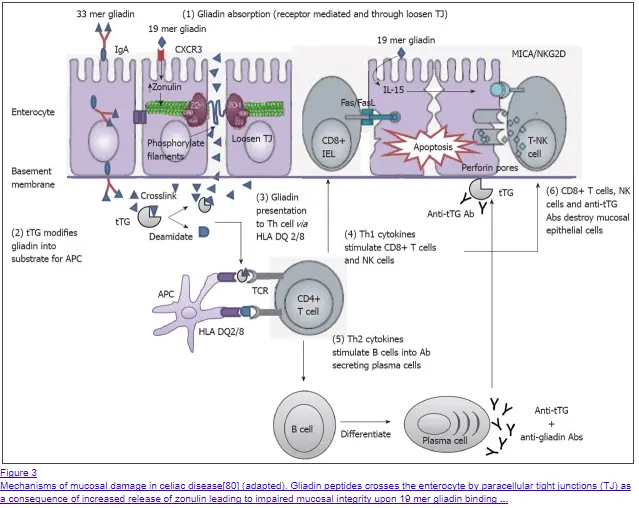
Many people may react poorly to certain foods but the reaction to certain foods seems to be limited to the gastrointestinal tract – meaning they most likely experience gas, bloating, or abdominal pain.
You can put lactose intolerance into this category.
On the other hand, other food groups may cause symptoms that exist outside of the intestinal tract.
Symptoms outside of the intestinal tract may include things like depression, anxiety, other mood changes, weight gain, hormonal changes, etc.
These symptoms likely indicate problems with the metabolism and processing of certain food groups and how they interact with the intestinal lining.
Gluten sensitivity issues tend to fall into this category, making them more important than regular food intolerance.
So how do you know if gluten is causing changes in your body that need to be taken care of?
We can first start by discussing the various conditions that gluten can cause in your body.
Celiac Disease vs Non-Celiac Gluten Sensitivity
The first and most serious condition related to gluten is a condition known as Celiac disease (4).
Celiac disease is a condition in which your body creates antibodies to gluten particles.
Upon consumption of gluten, your body reacts to various portions of the gluten molecule which results in immune-mediated damage to the intestinal tract (5).
Damage to the intestinal tract results in blunting of the intestinal villi which may result in malabsorption of both nutrients and calories leading to many different problems.

This damage may also cause increased intestinal permeability and allow the absorption of pathogens and particles that would otherwise not have been absorbed.
This mechanism is what many believe may be the link between the development of further autoimmune diseases and Celiac disease and is known as molecular mimicry (6).
Celiac disease results in symptoms in both the intestinal tract and outside of the intestinal tract.
The diagnosis of Celiac disease (7) is made by assessing serum levels of certain antibodies, the presence of which may indicate the disease state in your body (more on this below).
You can see an example of a positive test below:
The “gold standard” for diagnosis of Celiac disease is an intestinal biopsy which shows immune-mediated damage and intestinal damage.
In most cases, this is NOT necessary as the presence of positive antibodies in the serum should be enough to make the recommendation to alter your diet.
Celiac disease is just one condition on the “gluten intolerance” spectrum (8).
But what if you have all of the symptoms of gluten intolerance but negative antibodies to gluten in your bloodstream?
This is where things can be confusing (but they don’t have to be).
The main question is this:
Can you be intolerant to gluten without the presence of antibodies in your body?
The answer is an obvious yes.
This condition is known as non-celiac gluten sensitivity and it’s well described in the literature (9).
Non-Celiac gluten sensitivity (or NCGS for short) is a condition that results in irritable bowel syndrome-like symptoms (including extra-intestinal symptoms) that tends to completely or partially resolve with a gluten-free diet.
Because this condition is relatively new to the gastrointestinal world it has not really been received well.
Many physicians believe (10) that there really can’t be a condition in which people simply don’t tolerate gluten and therefore gluten-free diets must be a fad.
The fact is that many people may have some issues (the degree of which varies) and therefore may do better on a gluten-free diet.
One problem with NCGS or gluten intolerance is that there really isn’t a great way to test for the condition.
But when it comes to this condition you don’t necessarily NEED to test for it.
If you have the symptoms of NCGS, in most cases, the best approach is to simply avoid gluten for 60 days and then determine if you improve.
If removal of gluten does not result in reduced inflammation, an improvement in your intestinal issues, or a reduction in other systemic markers then gluten intolerance may not be a problem for you.
On the other hand, it’s a relatively easy cheap, and effective test!
In fact, studies recommend a similar approach to the diagnosis of NCGS or gluten intolerance:
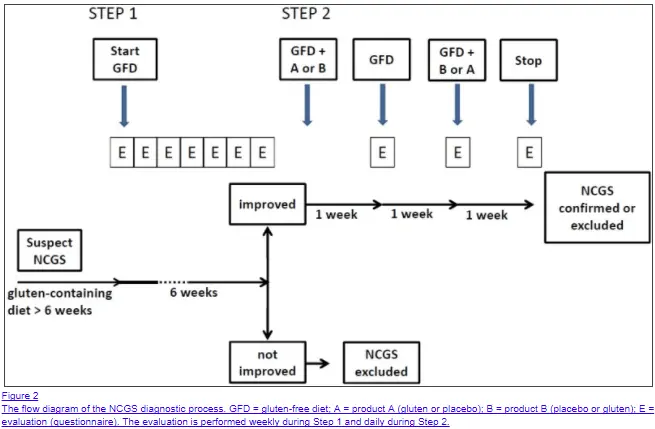
Studies recommend a gluten-free diet for at least 6 weeks (I recommend at least 8 weeks).
If there is no improvement then the diagnosis of NCGS is excluded, if there is an improvement then gluten may be part of the problem.
Testing for Gluten Intolerance & Celiac Disease
Testing for Celiac disease is relatively easy and cost-effective and more available than testing for gluten intolerance.
It’s estimated that anywhere from 1-3% of patients in the United States suffer from Celiac disease.

As a provider, I frequently check for Celiac antibodies in those patients who have autoimmune diseases (especially those with Hashimoto’s thyroiditis) and tend to uncover gluten intolerance in a surprising number of patients.
If you believe that you may be suffering from Gluten intolerance it is worth getting tested for Celiac disease.
The presence of these antibodies doesn’t mean you 100% have the condition but it can give you an idea of what is happening in your body and therefore help target treatment.
You can do this by assessing the following labs:
- IgA & IgG anti-gliadin antibodies (11) (up to 50% of patients with suspected NCGS have positive gliadin antibodies and these antibodies are also found in 80-90% of patients with Celiac disease)
- IgA endomysial antibodies
- Tissue transglutaminase antibodies (12) (IgA)
- Total IgA antibodies
- And genetic tests for HLA DQ2 and HLA DQ8
Positive tests stand out like a sore thumb and aren’t likely to be missed.
You can see an example of a positive (random) test below:

This patient has positive antibodies to IgA tissue transglutaminase antibodies as well as IgA Gliadin peptide antibodies indicating a likely issue with gluten metabolism in the body.
If you see a result such as this then your next step should be the removal of gluten from your diet.
Advanced Gluten Intolerance Testing
Beyond these tests, there are additional tests available to assess other fractions of the gluten protein.
Such tests as the Cyrex Array 3 can help test for subfractions to gluten including alpha, gamma, and omega gliadin fractions in addition to wheat germ agglutinin.
You can also test for gluten-associated cross-reactive food groups that may be causing intolerance or sensitivity to your GI tract as well.
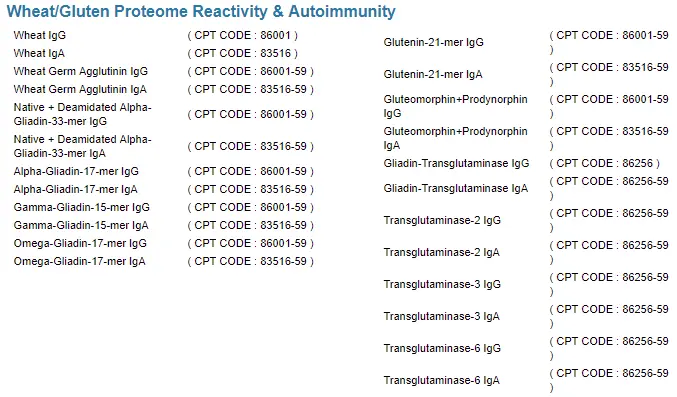
These include tests to casein, cow’s milk, milk chocolate, whey protein, millet, oats, and even yeast.
But are these advanced for gluten intolerance necessary?
Not for every case.
First:
Many cases of gluten intolerance can potentially be diagnosed with the traditional tests for Celiac disease (remember that these tests are not specific to Celiac disease and may be positive in patients with NCGS).
Second:
In some cases, it’s often better to simply adopt a 2-month gluten-free trial to determine if you have improved.
In other words – skip the testing and jump to treatment.
The idea behind advanced testing is that there are literally hundreds of portions of the gluten molecule that you may be intolerant to and standard tests may miss these.
In addition, serum tests are not 100% accurate in detecting reactions to small amounts of gluten as shown in various studies (13).
These may be helpful to determine if you are incredibly sensitive to gluten and may be unknowingly ingesting gluten.
Symptoms of Gluten Intolerance
Because there aren’t great tests to assess for gluten intolerance, assessing your symptoms can be a valuable tool.
The presence of 4+ symptoms from the list below may warrant a gluten-free trial in certain individuals.
It’s important to note that these symptoms may be experienced in those with Celiac disease as well as non-celiac gluten sensitivity.
The symptoms of gluten intolerance include:
- Irritable bowel syndrome-like symptoms (14) (gas and bloating after meals, pain with bowel movements, changes in bowel movements with certain foods, etc.)
- Chronic constipation (or alternating diarrhea/constipation)
- Depression, anxiety or other mood changes
- Nutrient deficiencies (especially B12 and Iron)
- History of autoimmune conditions (such as
- Symptoms of Leaky gut
- Fatigue
- Headaches or Migraines (especially if triggered after consuming certain foods)
- Skin issues such as acne, rashes or dermatitis
- Weakened immune system
- Muscle pain or cramps
- Brain fog or difficulty with concentration
- Functional abdominal pain
There is a lot of crossover between the symptoms of Celiac disease, Wheat allergy, IBS, and NCGS indicating that to some degree these symptoms may exist on a spectrum.
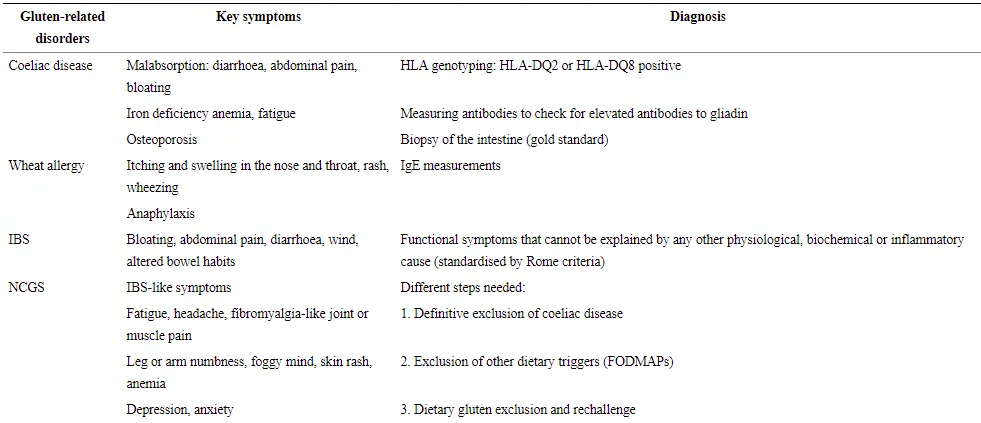
It is especially important to assess your symptoms if you plan to go gluten-free.
Identifying which symptoms may be related to gluten intolerance is important because it may help you determine if you have improved during a gluten-free trial.
Treating Gluten Intolerance
How do you treat gluten intolerance?
The answer is quite simple.
You simply avoid gluten for up to 8 weeks and assess your symptoms at the end of this period.
Avoidance of gluten means avoidance of gluten and you MUST ensure that you are avoiding it 100% to be sure that this method works.
Gluten can hide in products ranging from toothpaste to cosmetics and transdermal absorption may be a problem for some people.
Because of this, you will need to sit down and take an inventory of all of the products that you consume and place them on your skin/face to make sure that they are 100% gluten-free.
This is in addition to avoiding food sources of gluten.
Continue this for 8 weeks and then re-assess your symptoms.
This is a simple at-home test that you can do on your own, but please realize that you may benefit from more advanced testing and therapies from a knowledgeable physician to help guide you.
It’s important to realize that oftentimes chronic illnesses don’t stem from 1 problem.
While gluten intolerance may be contributing to your overall health it’s not likely that it’s the sole cause of all of your problems!
Wrapping it up
In my experience gluten intolerance is a problem for many people and a trial of going gluten-free may be extremely beneficial in many patients.
It’s best to start by checking for gluten antibodies in your blood.
If your blood test is positive then a trial of going gluten-free is your next step.
If your blood test is negative, but you still have the symptoms listed above, then you can consider checking more advanced tests to look at gluten antibodies to other subfractions or you can simply opt to go gluten-free at this point as well.
If you decide to go gluten-free you need to make sure that you go 100% gluten-free for a sufficient amount of time (8 weeks is usually long enough).
Gluten intolerance may result in both intestinal symptoms and extraintestinal symptoms so make sure to monitor your mood, your skin, joint pain, etc. when you go gluten-free.
Now I want to hear from you:
Do you think you have gluten intolerance?
Have you been tested before?
Did going gluten-free work for you?
Why or why not?
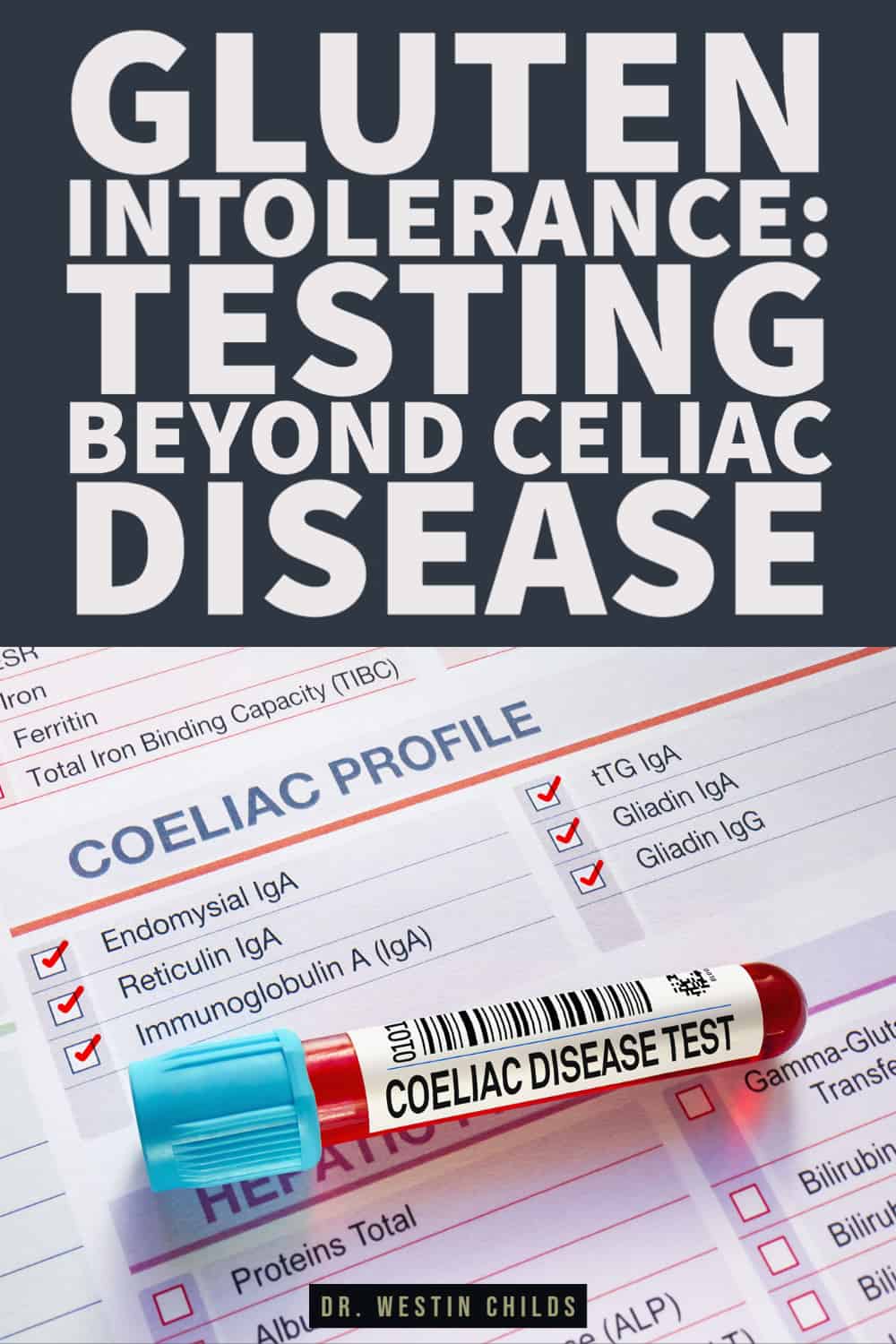
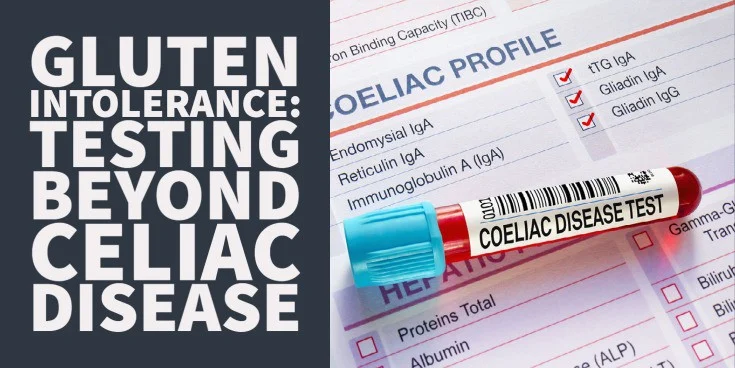



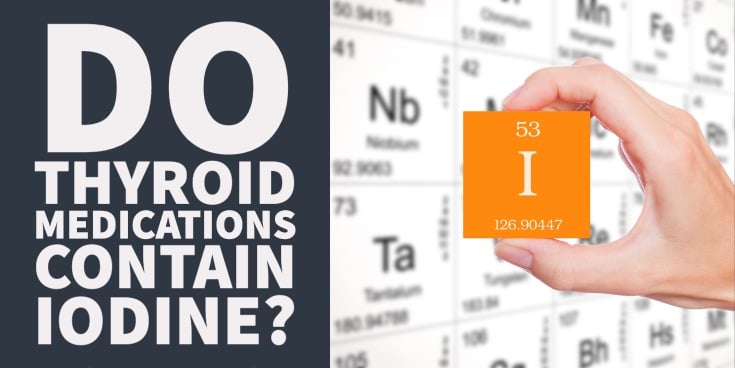
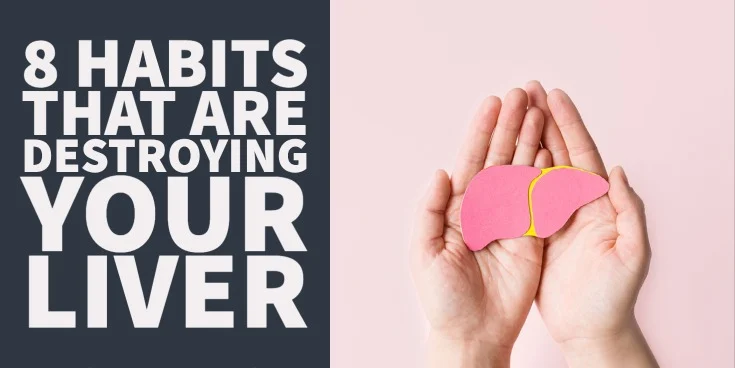


When I was diagnosed with Hashimotos in 2013, I started researching my condition and decided that it would be best to go gluten free. I have never been tested for Gluten intolerance because my insurance would not cover it, but as a result of avoiding Gluten, I have avoided all the crappies foods on the planet, so my health is much better as a result. Love your blog!
Hi Robin,
I definitely agree that one of the advantages to going gluten free is that it may ‘force’ you to give up unhealthy foods which will always be of some benefit. Thanks for sharing!
I would like to know if i have avoided Gluten for 1 year and only now i have decided to get tested for tolerance. will the test still be accurate? Thank you
Hi Julia,
Provided you have been avoiding gluten 100% the test will not be accurate.
I tested positive for wheat and yeast sensitivity and although I’m not fullly allergic or celiac, when I eat wheat my heart rate increases and I experience heartburn. I never had this problem in my 20s or 30s but now in my 40s my body can no longer handle it. I should also note though that if I eat wheat grown in some European countries, I experience no side effects. The wheat grown in the USA is laboratory garbage.
Hi Kristina,
Thanks for sharing! It is true that due to genetics, environment, etc. sometimes you can develop sensitivities over time, which may be contributing to your current set of symptoms even though you tolerated wheat fine in your 20’s and 30’s.
I have had on and off above symptoms for over 18 months. I was tested for celiac disease and was negative. I can eat wheat from time to time and then all of a sudden symptoms come back again and it seems to be related to gluten but I am really not sure. Any other tests I should get to get to the bottom of this?
Hi Chrispy,
You could also look into a delayed IgG food sensitivity test if you wanted to look at other food groups.